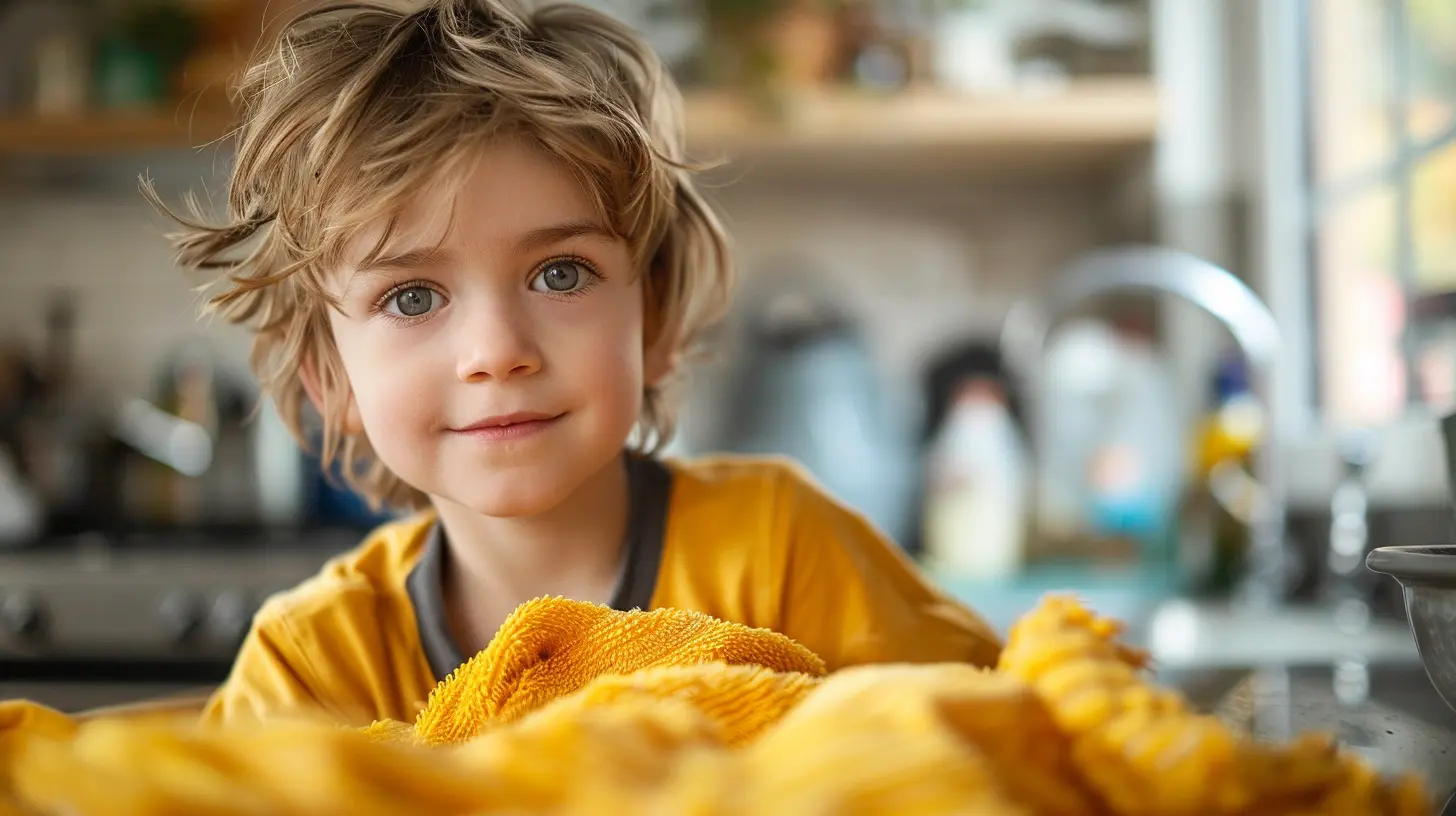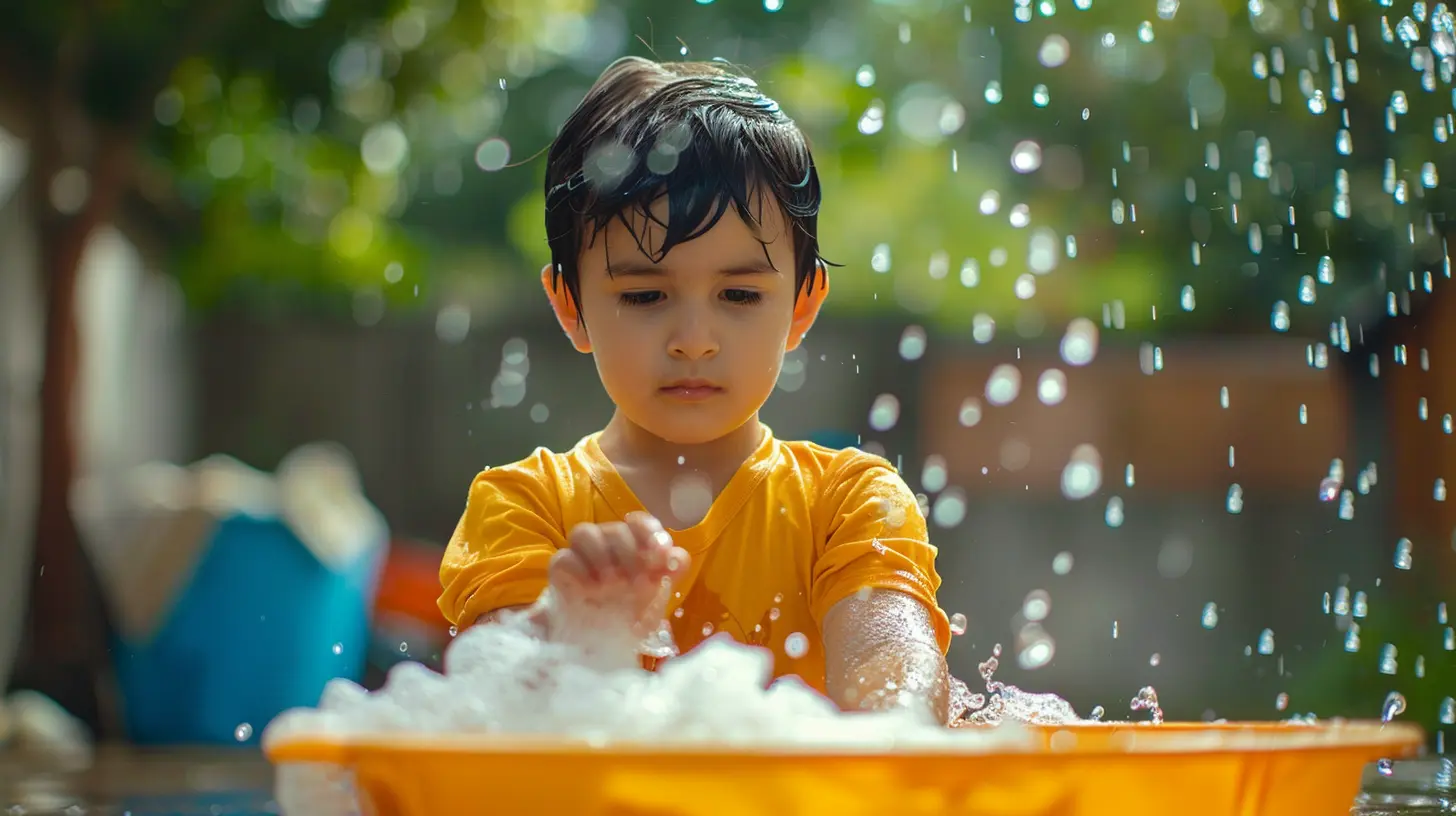Positive Discipline: Using Chores to Teach Respect and Structure
13 June 2025
Let’s be real for a second—chores are rarely met with cheers and excitement. Whether it’s folding laundry, washing dishes, or picking up LEGO bricks that have mysteriously scattered across the universe (yes, even under the couch and behind the toilet), chores often come with eye-rolls and negotiations.
But what if chores weren’t just about clean floors and organized toy chests?
What if they were a powerful tool for teaching kids something much deeper—respect, responsibility, and the structure that sets them up for lifelong success?
Welcome to positive discipline, where the goal isn’t control or punishment. Instead, it’s about guidance, connection, and encouraging kids to grow into capable, caring humans.
In this article, we're diving into how chores—yes, simple household tasks—can become meaningful lessons rooted in respect and structure. Grab a cup of coffee, settle in, and let’s turn those daily duties into golden opportunities.
What Is Positive Discipline, Anyway?
Before we dive into the nitty-gritty of chores, let's get on the same page about positive discipline. No, it's not about letting kids do whatever they want with zero consequences. And it's definitely not the traditional “because I said so” approach.Positive discipline is all about teaching rather than punishing. It’s focused on mutual respect, consistent boundaries, and helping children learn why certain behaviors matter. When done right, it fosters emotional intelligence, independence, and a stronger parent-child bond.
Think of it this way: you’re not the boss barking orders—you’re the coach guiding your team.

Why Chores Are the Perfect Teaching Tool
Chores—those everyday, routine tasks—are often underestimated in the parenting world. But they’re an incredible way to naturally introduce:- Structure: Kids thrive on routine. When they know what’s expected, they feel secure.
- Respect: Contributing to the household shows them they’re part of a team.
- Responsibility: Completing a task from start to finish is a confidence booster.
- Life skills: Cooking, cleaning, and organizing? Priceless tools for adulthood.
Let’s not forget the pride a child feels when they say, “I did that!” That’s worth its weight in gold.
Start With the Right Mindset
First things first—if we want our kids to respect chores, we need to change the way we talk about them. If chores are always framed as annoying punishments or nagging obligations, guess what? Our kids will see them that way too.Instead, try to shift the narrative. Chores aren’t burdens; they’re opportunities to be helpful, capable, and connected to the family unit. That shift in mindset makes all the difference.
Ask yourself:
- How do I talk about chores in front of my child?
- Do I model a positive attitude toward tasks?
- Do I treat mistakes as learning moments?
Setting Expectations: It’s All About Age-Appropriate Tasks
It’s tempting to expect your 3-year-old to clean up like a miniature adult, but let’s keep it real. Age-appropriate chores are key to setting kids up for success—without tears (yours or theirs).Here’s a simple breakdown to get you started:
Toddlers (Ages 2–4)
- Put toys in bins- Wipe up small spills
- Place laundry in the basket
Keep it short, simple, and celebrate every effort like they just won a gold medal.
Early Elementary (Ages 5–7)
- Make their bed- Water plants
- Feed pets
- Set the table
Kids at this age love feeling grown-up. Keep the tone playful and positive.
Tweens & Teens (Ages 8+)
- Do laundry- Vacuum
- Wash dishes
- Cook simple meals
This is where the magic happens. They're capable—so don’t be afraid to challenge them with bigger responsibilities.
The Secret Sauce: Consistency and Routine
One-off chores don’t teach structure—they teach... meh. It's the regular, consistent rhythms that build respect and responsibility over time.Here’s how to establish a healthy routine:
1. Create a Chore Chart
It doesn’t have to be Pinterest-perfect. A whiteboard, sticky notes, or even a printed checklist works just as well. Visual reminders help kids stay accountable without constant nagging.2. Tie Chores to Daily Routines
Make chores part of morning or evening rituals. For example, “After breakfast, we clear our plates,” or “Before bed, we feed the dog.”3. Use Timers or Music
Turning chores into a fun challenge makes them feel less like work. “Let’s see if we can clean up the toys before this song ends!” It’s like a mini game show, but everyone wins.Encouragement Over Enforcement
If you’re looking for lasting results, go heavy on encouragement and light on punishment. Here’s what works:Praise Effort, Not Perfection
“Wow, you worked really hard folding those towels!” is way more effective than “You missed a corner, redo it.”Offer Choices When You Can
“Would you rather sweep or wipe the counters?” Giving choices builds autonomy and decreases resistance.Use Natural Consequences
If your child forgets to pack their lunch (a chore), let them experience a bit of hunger at school. That lesson will stick much more than a lecture would.What About Resistance? (Because It WILL Happen)
Let’s not sugarcoat it: sometimes your kid will drag their feet. They’ll whine, push back, or suddenly claim they have a mysterious illness that only appears during chore time.Here’s how to respond—without losing your cool:
Stay Calm, Stay Firm
Consistency is the name of the game. “I hear you’re not in the mood, but this is your responsibility.”Connect Before You Correct
Sometimes, resistance is a sign that something deeper is going on. Before jumping to discipline, ask, “Is something bothering you today?”Don’t Expect Instant Gratification
Chores are long game parenting. You may not see results today—or even next week. But stick with it, and it will pay off.Making It a Family Affair
Want chores to really work their magic? Make them a team effort.When kids see parents and siblings all chipping in, they realize they’re part of something bigger. This sense of belonging nurtures respect and cooperation—and guess what? Your home runs more smoothly too.
Try:
- Family clean-up time with music blasting
- Saturday morning chore parties (complete with post-cleaning pancakes)
- Trading chores so each family member gets variety
The Bigger Lessons Behind the Broom
Every time your child completes a chore, they’re picking up more than just dust bunnies. They're learning:- Confidence: “I can do this!”
- Contribution: “My role matters here.”
- Work ethic: “Even when I don’t feel like it, I can still follow through.”
- Respect for others: “Keeping our space clean makes everyone happier.”
And those lessons? They transfer beautifully to school, friendships, and eventually, the workplace.
When to Let Go (Yes, Really)
One of the hardest parts of assigning chores is watching your child do something... imperfectly.Maybe they stacked the plates slightly crooked. Maybe the vacuum lines aren’t parallel (gasp!).
But guess what? That’s okay.
Let them struggle. Let them try. Let them learn. Your job isn’t to mold mini perfectionists—it’s to raise secure, responsible people who take pride in their efforts.
Wrapping It Up: Chores Are So Much More Than Tasks
If all this chore talk still feels overwhelming, remember—you’re not alone. Parenting is, hands down, one of the hardest and most rewarding jobs out there. But it’s also full of simple moments that offer lifelong impact.Chores are a tiny part of your day, but they hold massive potential to teach respect, foster responsibility, and help your child learn the value of structure.
So next time you're tempted to just clean up the toys yourself because it’s faster or easier, pause.
Invite your child to help. Laugh through the mess. Celebrate the effort.
Because in that moment, you’re not just cleaning your living room—you’re shaping character.
all images in this post were generated using AI tools
Category:
Chores For KidsAuthor:

Austin Wilcox
Discussion
rate this article
3 comments
Melanie Barnes
Great insights on using chores as a tool for teaching respect and structure! Incorporating responsibility into daily routines not only fosters discipline but also strengthens family bonds. A wonderful approach to instill valuable life skills in children!
June 20, 2025 at 4:18 PM

Austin Wilcox
Thank you for your thoughtful comment! I’m glad you found the connection between chores and valuable life skills so compelling. Building responsibility truly does enhance family relationships!
Cypher Rodriguez
Chores build responsibility and family respect.
June 15, 2025 at 2:26 AM

Austin Wilcox
Absolutely! Chores are a great way to instill responsibility and foster respect within the family. They teach valuable life skills and promote teamwork.
Heidi Alexander
I love this approach! Turning chores into a positive experience not only teaches kids responsibility but also helps them appreciate teamwork. It’s amazing how a simple task can foster respect and structure in a fun way. Can't wait to implement these ideas in our family routine—thanks for sharing!
June 14, 2025 at 4:03 PM

Austin Wilcox
Thank you for your kind words! I'm glad you found the ideas helpful. Wishing you and your family joyful moments while you implement them!



